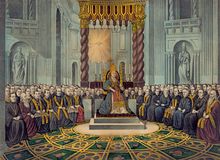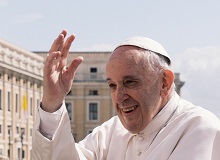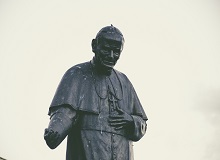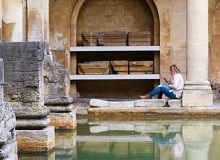


The agreement will be extended for 2 years. “It does not address all the open questions that still concern the church, but just the topic of episcopal appointments”, The Holy See admits.

Creation care does not require “spiritual ecumenism” with non-evangelicals to be pursued faithfully and responsibly. Co-belligerence is sufficient.

Ecumenism in creation care, the upcoming encyclical by Pope Francis, and the state of religious freedom in China, are the issues that concern the Italian Evangelical Alliance.

Vatican I further solidified the nature of the papal office as a quasi-omnipotent and infallible figure.

The involvement of James I. Packer with the Evangelicals and Catholics Together initiative has puzzled many of his admirers.

Moving beyond the perimeter of the biblical faith, Roman Catholicism legitimizes prayers to other deities or religious ideals.

The unsettled legacy of John Paul II one hundred years since his birth.

For missiological, theological, evangelistic, and strategic reasons, evangelicals must try to enter the Roman Catholic mindset and gently challenge it with the gospel.

The Pope is offering an outpouring of indulgences. The message that Roman Catholicism is giving in these weeks of coronavirus crisis is a disarming detachment from the basic principles of the biblical faith.

Pope Francis tends to idealize native cultures, seeing them as already infused by the grace of God.

Roman Catholicism is built on the conviction that its system is capable of keeping together its unchangeable Roman identity and its ever-increasing Catholicity.

The link between the Holy Spirit and the Church is so organic that “for Benedict, Scripture, tradition, and the Roman magisterium always coincide because they are guided by the same Spirit”.

The decision would allow the Vatican to hand over documents concerning crimes against children. Survivors associations respond with caution.

What does Matthew teach us about Christmas?

On the damages of Augustine’s formula and the correction of the Protestant reformation.

A book recently published says the institution loses 120,000 euros a day. “The situation has become worse with Francisco”, Vatican expert Leonardo De Chirico says.

The Bible teaches that mission requires believers in Jesus Christ to be sent, not people baptized by the Church. This is a significantly different view than that of Pope Francis.

Standing on the shoulders of the apostolic catholicity recovered by the Reformation, this is a promising way to reclaim and to live out the catholicity of the Church in our broken world.

These sixteen stories serve as a useful read for evangelical leaders seeking to understand common themes that might help to understand what influenced an evangelical intellectual to embrace the Roman Catholic Church.

Something is missing in the answers of the Pope. Christ is never mentioned in the whole interview.

Doctrines and practices cannot be disjoined as if they were independent silos, but must be seen as mutually influencing one another.

Marian devotions were fueled by writings that were never considered to be inspired. Mariological ideas and practices were added from the outside and allowed to penetrate the faith of the people.

Evangelical theology needs to pursue a realistic reading of the Fathers under the supreme authority of Scripture and at the service of the cause of the gospel.

The recent book by Thomas G. Guarino, The Disputed Teachings of Vatican II. Continuity and Reversal in Catholic Doctrine, is particularly helpful for evangelicals for at least two reasons.

Pope Emeritus Benedict XVI denounces a “new, modern Catholicity” that overturned the traditional moral fabric of Catholic theology and opened the door to the justification of homosexuality and other sexual promiscuities among the clergy.

Las opiniones vertidas por nuestros colaboradores se realizan a nivel personal, pudiendo coincidir o no con la postura de la dirección de Protestante Digital.